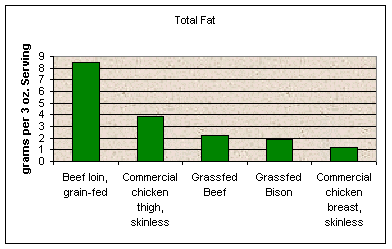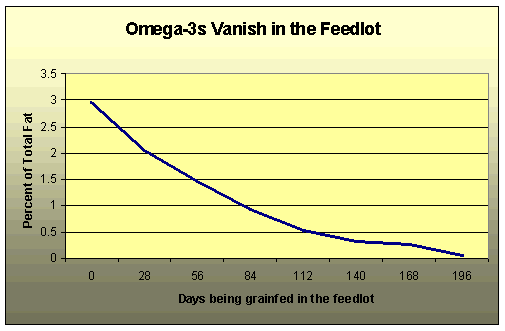 |
|
Red Meat
Is a good source of protein but
conventional beef is loaded with saturated fat. Grain-fed cattle
is 50% saturated fat. (Nuts, seeds, and beans are a good source of
protein too without the saturated fats.) Grass-fed and
grass-finished beef is good in moderation and is only 10% saturated fat.
It's
important the the beef is grass-finished as
well because a week's worth of grain will take away the vital Omega
3 and CLA
benefit! It's important that no chemicals are used on the grass
but it's hard to find a certified Organic and Grassland
Beef. Grassland
Beef has explained to us that their
cattle is 100% Grass-fed, they are never fed animal by products, only a
healthy vegetarian diet, they have room to roam and are treated in the
most humane way, all the way up to slaughter, so much so that they were
looking into getting kosher certification. Their pastures are not
treated with any chemicals, their cattle is never given growth hormones
nor are they given the daily low grade antibiotic like most conventional
cattle. Delicious
Organics feels comfortable offering and recommending Grassland
Beef.
Isn't "Natural" good
enough? Natural is simply a label for ANY food
product which means that the product does not contain artificial
flavors, colors, or preservatives and that it is minimally processed.
Virtually ALL beef is "natural!" Organic Beef
is:
Animal
products are not natural food for cattle. Organic beef, since they
are never fed animal products, are therefore a safe choice in avoiding
Mad Cow disease. However, grain is not the natural diet of the cow
and affects their nutritional value to us. Cows, Sheep and other
grazing animals convert grass into powerful nutrients for our bodies. In
addition, manure is a big problem on conventional farms and pollutes our
environment and creates a risk to our health and waters (where it can
poison our waters with E Coli and other pathogens). Organic
farmers, by contrast, use it (and can use it because it's chemical-free)
as fertilizer. This is recycling at it's best! Grass-fed Organic Beef
is
a the best choice for many reasons. Nutritionally far superior to
it's organic cousins, grass-fed beef actually contains Omega 3s and CLA!
Conjugated Linoleic Acid naturally occurs in beef. Research now
shows that CLA combats cancer, combats clogged arteries, may suppress
existing cancer growth, reduces body fat and prevents or delays
diabetes. They also have four times the amount of Vitamin E. Mad
Cow disease is avoided in organic cattle since they graze naturally an
Lower
in overall fat, and lower in saturated fat, grass-fed beef is good food.
Because they are leaner, the meat cooks a little quicker and you have to
be careful not to dry it out. It is lower in overall fat.
The meat may taste a little different to you; it is delicious! It
is difficult or impossible to find Grass-fed Organic (and Kosher, wow,
that would be ideal) beef, but we are still hoping and looking. If
we must choose between grass-fed or organic grain-fed, the best option
is Grass-fed
over Organic. Kosher
has to do with the way the animal is slaughtered. It must be
slaughtered in the most humane way possible to cause the least amount of
stress to the animal. Animals raised for kosher slaughter have a
better life (much like an organic or grass-fed animal) with more room,
no animal by-products in the feed, and a healthier environment. Kosher
also has to do with what foods may be eaten, what foods can be eaten
with other food, how these foods are prepared, how the food is processed
(not to include non-kosher ingredients) and manufactured (in a facility
that complies with kosher dietary standards and doesn't mix meat (or
poultry) and milk, for example) and how the animal is slaughtered.
Most slaughterhouses well, wack 'em, and that stress, after all, ends up
on our plates. Kosher slaughtering is quick and there is no risk
of mad cow disease since it is done in a halathic (healthful and
according to the laws of kashrut) way. Making chicken
or beef kosher for us to purchase takes about three times as long as
non-kosher; that's why they are more expensive. Specially trained
rabbinical inspectors check every animal for signs of abnormalities or
disease and will reject those otherwise acceptable by government
standards.
Grass-Fed and Grain-Finished Beef:
Buyer Beware - a "mostly" grass-fed cow that is
"finished" with grain loses it's most of it's nutritional
Omega 3 value. Each day that they are fed grains, their omega 3
diminishes. They will lose all the Omega
3s stored when they are fed grains to
fatten up before slaughter. Conventional cows are:
Aside
from all this, conventional feedlots cause harm to our environment.
Conventional
cows raised in Feed Lots have very little CLA
benefit and do have a higher fat content. E Coli is in the
intestines of most feedlot cattle since the feeding of corns and grains
has caused the acidity of their stomachs to be much like humans.
Links:
|

